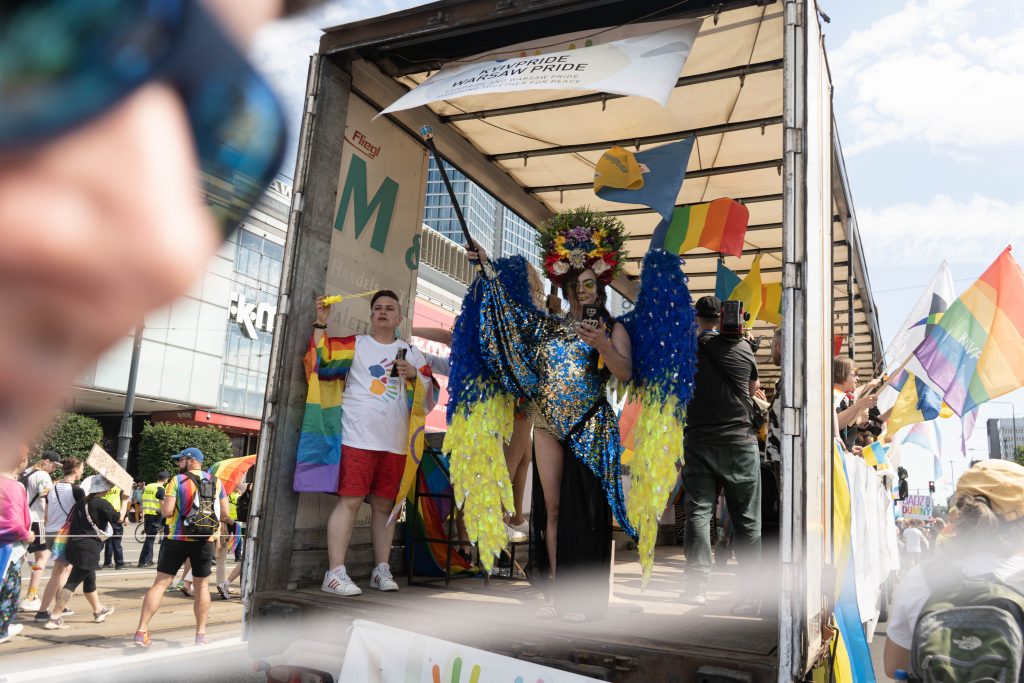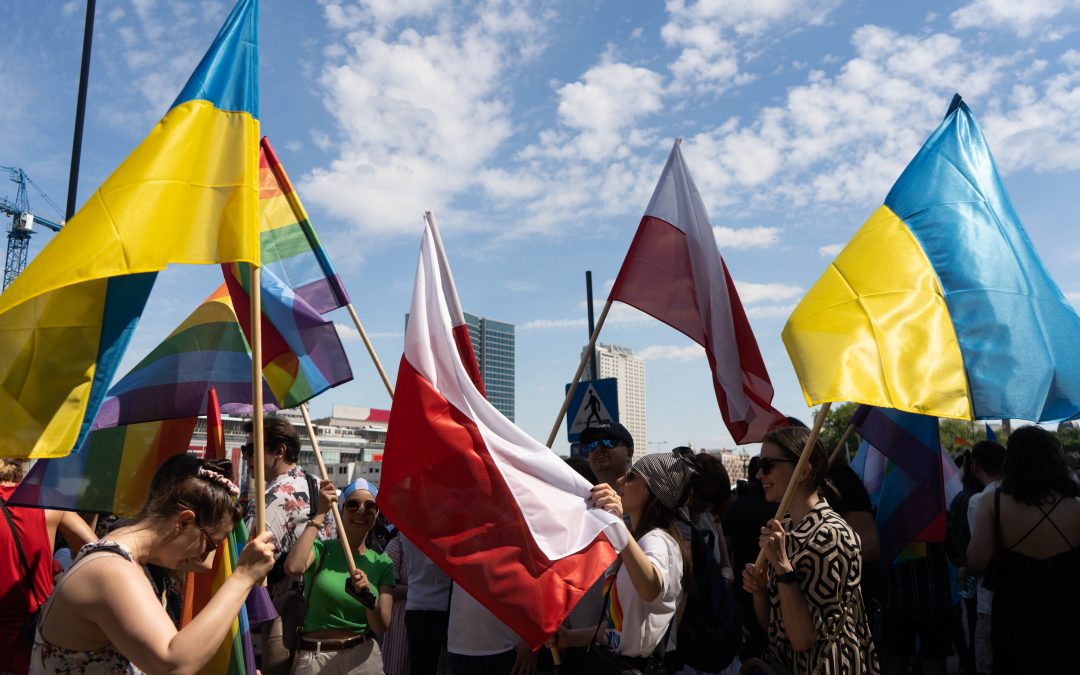Tens of thousands of people today marched through central Warsaw at the annual LGBT Equality Parade. This year’s event was held jointly with the KyivPride march, forced to relocate from war-torn Ukraine.
The usual rainbow flags, the symbol of the LGBT community, were joined by many blue-and-yellow Ukrainian and white-and-red Polish national ones as marchers gathered on a hot day outside the Palace of Culture and Science.
They were joined by 30 floats moving along the route, as many participants held aloft placards, chanted and sang songs in Ukrainian as well as Polish. “Love will win”, “We are with you” and “Rise above war” were some of the slogans on display.
slava ukrajini
🇺🇦 pic.twitter.com/4Pw2ZfNNQj— maksym.eristavi 🇺🇦🏳️🌈 (@maksymeristavi) June 25, 2022
“For us, in the Equality Parade, community means standing in defence of others,” wrote the organisers of the Warsaw march. “Community means marching arm in arm for the safety and freedom of those who have had it taken away. We are proud to join Kyiv in their march for Ukraine’s victory.”
Following Russia’s invasion of Ukraine, the KyivPride organisers decided to move the 10th edition of their march from Kyiv to Warsaw. Poland has been the primary destination for Ukrainian refugees, with an estimated 1.5-2 million still in the country.

One of the floats at today’s march (photo: Alicja Ptak)
In a speech at the start of the march, Warsaw Mayor Rafał Trzaskowski, who was joined on the route by EU equality commissioner Helena Dalli, also emphasised the unique nature of this year’s event.
“Beyond our eastern border, war is going on, and this parade will therefore be special, Trzaskowski said, quoted by Wirtualna Polska. “I am very happy that we can walk together to bear witness to the fact that the vast majority of Poles with open minds are tolerant and European and have respect for absolutely everybody.”
Warszawa jest dla wszystkich! Dziękuje wszystkim uczestnikom dzisiejszej #ParadaRówności! pic.twitter.com/k7bJMr3Glz
— Rafał Trzaskowski (@trzaskowski_) June 25, 2022
“This parade is special because we have friends from Ukraine with us, that’s why we took the Polish and Ukrainian flags with us,” Andrzej Kompa, a 42-year-old historian, told Notes from Poland.
“As I am older, I can see that these changes are taking place in society…under the influence of our courage, who don’t want to sit in the shadows. Politicians should not be afraid that we want to do some kind of revolution here, they should only adapt the law to what we as a society are already.”
LGBT rights have become a part of a wider struggle in both Poland and Ukraine, with opponents seeing marches and activism as an invasive “ideology” foreign to their traditional values.
Although in both countries polling has shown attitudes towards the LGBT community shifting in a more accepting direction, they have also both recorded recent declines in the “Rainbow Europe” ranking produced by ILGA-Europe, which looks at the legal and social situation faced by LGBT people.
This year, Poland fell to its lowest ever position in the ranking, placing 44th out of 49 European countries.
Poland has been ranked as the worst country in the EU for LGBT people for the third year running by @ILGAEurope.
For more, see the Rainbow Europe report (https://t.co/njV9lB0bep) and our article on last year's ranking (https://t.co/KssEwnZCQC). pic.twitter.com/6o2HW09vFc
— Notes from Poland 🇵🇱 (@notesfrompoland) May 12, 2022
Ukraine ranked 39th, as “anti-LGBT hate speech and hate crimes continued to be a severe issue”, the authors of the ranking said.
“I came here because I wanted to support the LGBT community,” said Yana, a 23-year-old Ukrainian woman who has been living in Poland for six years, at today’s march. “I used to be homophobic because of our community, but I changed my mind and now I just want to support these people [to show them] that they are enough as they are.”
In 2019 and 2020, Polish pride parades became a flashpoint ahead of national and presidential elections, with senior politicians from the ruling Law and Justice (PiS) party using strong anti-LGBT rhetoric. Warsaw held the first such march in Poland, in 2001, although two later editions were banned by the city’s then mayor, Lech Kaczyński.
Main image credit: Alicja Ptak

Alicja Ptak is deputy editor-in-chief of Notes from Poland and a multimedia journalist. She has written for Clean Energy Wire and The Times, and she hosts her own podcast, The Warsaw Wire, on Poland’s economy and energy sector. She previously worked for Reuters.




















